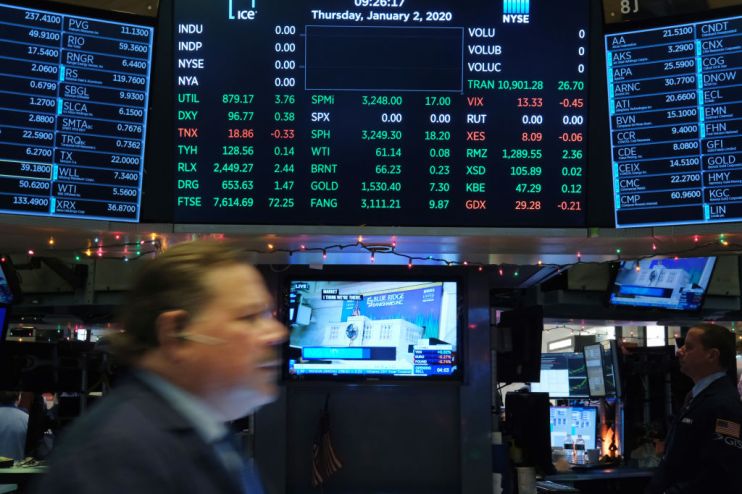What do the financial markets hold in store for 2020?

After the festive break, everyone in the City is slowly settling back into work. The opening week of 2020 has been hectic already, with oil and gold prices rising and stocks falling in reaction to tension in the Middle East.
But what else are the financial experts and asset managers keeping an eye on for the year ahead?
Living in America
US equities were the best performing asset class in 2019, according to research by investment platform Fidelity, producing a total return of 25 per cent. The next best performers were global equities at 21 per cent, and real estate at 20 per cent. In fact, 2019 was the best year for US stocks since 2013.
So will US equities continue to outperform this year? Not necessarily. There’s a great deal of geopolitical uncertainty hanging over American stocks, such as whether the US-China trade war will be resolved, and how Iran will react to the drone strike that killed its top general Qasem Soleimani.
And then there’s the presidential election campaign and the question of whether Donald Trump will hold onto the White House in November.
“One issue that is not uppermost in investors’ minds currently, but will become increasingly so, is the election cycle in the US and the potential for a lot more domestic political noise in the US,” warns Jeremy Podger, portfolio manager of the Fidelity Global Special Situations Fund. “This, in turn, could mean that other parts of the global equity markets will become more attractive than the US.”
Land of the rising sun
One such region that may become more attractive is Japan. Its stocks produced a total return of 15 per cent for investors last year, according to Fidelity’s research.
This year, Naoya Oshikubo, senior economist at Sumitomo Mitsui Trust Asset Management, believes that the country’s economic growth will remain solid, boosted by the Olympics.
“The Tokyo Olympics and Paralympics will have a significant economic impact of around 32 trillion yen (approximately $29bn) — much bigger than the 2019 Rugby World Cup — boosting inbound and domestic tourist consumption,” he says.
“Among the sectors which are due to benefit from this global sporting event are manufacturing, in particular companies producing electrical equipment such as TVs, as well as the leisure sector with companies in the fitness business (such as gyms), dining services, and hotels expected to reap great rewards.”
Oshikubo tips Sony, which controls a large share of the high-end TV market, and NEC, a tech firm whose facial recognition system will be used for security at the Olympic games, as two companies set to benefit.
He also predicts that Japan’s equity market will increase in 2020, backed by solid corporate earnings growth.
“The stock market will also benefit from the Olympic games, as historic data shows that markets of countries hosting the games tend to rise,” he added. “In fact, since the 1984 Los Angeles Olympics, every host nation has seen higher share prices at the end of the year following the games compared to the year preceding. Japan should be no exception.”
Back in Britain
What about things back home? The performance of UK equities was similar to Japan, producing a total return of 15 per cent last year.
Of course, the UK has its own uncertainties to deal with, primarily focused around whether Prime Minister Boris Johnson will actually manage to “Get Brexit Done” and strike a trade deal with the EU this year. But beyond this political uncertainty, the economic picture for the UK has improved for 2020, according to Adam Avigdori, co-manager of BlackRock Income and Growth Trust.
“The employment market is strong, with underlying growth in both nominal and real wages for the first time in recent years. Combined with increasing fiscal spending, we believe the UK economic outlook is more encouraging,” he says.
The path less trodden
Away from the developed economies, emerging markets are also looking enticing to some investors.
Last year, emerging market equities produced a modest total return of about nine per cent, outperforming corporate and government bonds, as well as commodities.
Looking ahead, emerging markets offer potentially strong opportunities for long-term investors. Some stocks in this region are trading at low valuations and paying attractive dividends, according to Emily Fletcher, co-manager of BlackRock Frontiers Investment Trust.
“In terms of the regional outlook, we continue to like Latin America,” she adds.
“Meanwhile, the sentiment on the ground in China remains mixed with consumer activity doing well but industrial and trade indicators slowing. Despite the stimulus feeding through into the real economy, sentiment is affected by trade tensions and businesses remain hesitant to invest in this environment.”
The Roaring Twenties
While we’ve looked at a few specific regions, what about the markets as a whole? Global equities produced a total return of 22 per cent last year — a particularly stellar performance, but will it be repeated?
Not likely, according to some market analysts.
Last year’s outperformance was partly just a bounce back after the sharp sell-off seen in late 2018, argues Rupert Thompson, chief investment officer at Kingswood. He predicts that returns are likely to be considerably lower this year.
“The economic backdrop has undoubtedly improved, and we are expecting global growth to pick up,” he says. “However, the upturn will be modest and clear risks remain — not least on the geopolitical front, as highlighted by the latest ratcheting up of US-Iran tensions. Renewed growth in corporate earnings is likely to be needed if equity markets are to sustain further gains.”
Making predictions about the future can of course often prove to be a fool’s errand — crystal balls don’t work in real life. And even with all the data and analysis at hand, unforeseen events can rapidly upset markets.
What we do know is that the investment landscape in 2020 will be far from dull.
Main image credit: Spencer Platt/Getty Images